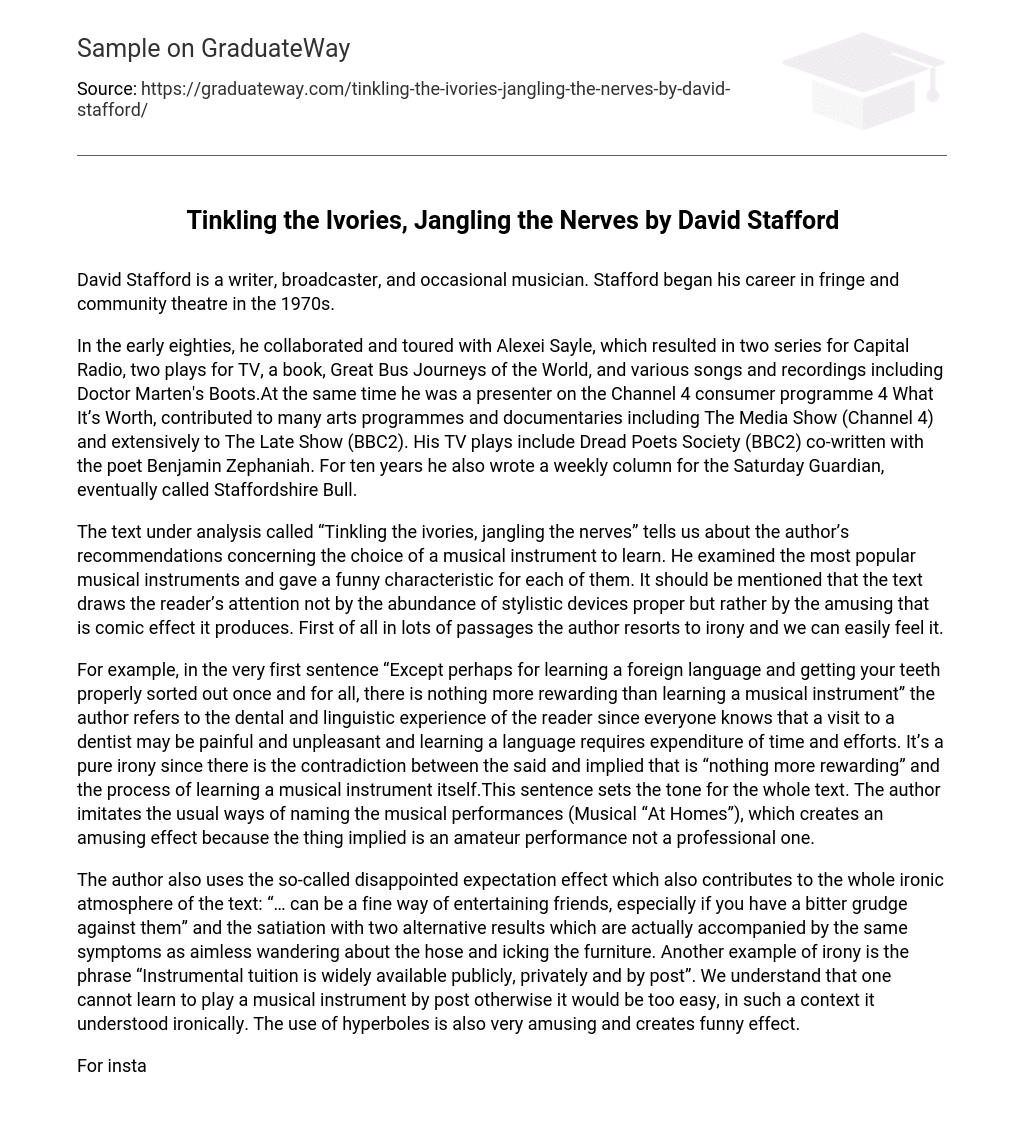David Stafford is a writer, broadcaster, and occasional musician. Stafford began his career in fringe and community theatre in the 1970s.
In the early eighties, he collaborated and toured with Alexei Sayle, which resulted in two series for Capital Radio, two plays for TV, a book, Great Bus Journeys of the World, and various songs and recordings including Doctor Marten’s Boots.At the same time he was a presenter on the Channel 4 consumer programme 4 What It’s Worth, contributed to many arts programmes and documentaries including The Media Show (Channel 4) and extensively to The Late Show (BBC2). His TV plays include Dread Poets Society (BBC2) co-written with the poet Benjamin Zephaniah. For ten years he also wrote a weekly column for the Saturday Guardian, eventually called Staffordshire Bull.
The text under analysis called “Tinkling the ivories, jangling the nerves” tells us about the author’s recommendations concerning the choice of a musical instrument to learn. He examined the most popular musical instruments and gave a funny characteristic for each of them. It should be mentioned that the text draws the reader’s attention not by the abundance of stylistic devices proper but rather by the amusing that is comic effect it produces. First of all in lots of passages the author resorts to irony and we can easily feel it.
For example, in the very first sentence “Except perhaps for learning a foreign language and getting your teeth properly sorted out once and for all, there is nothing more rewarding than learning a musical instrument” the author refers to the dental and linguistic experience of the reader since everyone knows that a visit to a dentist may be painful and unpleasant and learning a language requires expenditure of time and efforts. It’s a pure irony since there is the contradiction between the said and implied that is “nothing more rewarding” and the process of learning a musical instrument itself.This sentence sets the tone for the whole text. The author imitates the usual ways of naming the musical performances (Musical “At Homes”), which creates an amusing effect because the thing implied is an amateur performance not a professional one.
The author also uses the so-called disappointed expectation effect which also contributes to the whole ironic atmosphere of the text: “… can be a fine way of entertaining friends, especially if you have a bitter grudge against them” and the satiation with two alternative results which are actually accompanied by the same symptoms as aimless wandering about the hose and icking the furniture. Another example of irony is the phrase “Instrumental tuition is widely available publicly, privately and by post”. We understand that one cannot learn to play a musical instrument by post otherwise it would be too easy, in such a context it understood ironically. The use of hyperboles is also very amusing and creates funny effect.
For instance, the author noted that people who are going to learn a musical instrument can expect low back pain, shoulder strain, and even bleeding and unsightly swelling if they decided to do it properly. The paragraph which tells us about the chap from the pub and his electric accordion is another example of such kind. The opposition “small room – large amplifier” helps to justify the author of his decision to apply to The International Court of Human Rights because such a performance was crime against people.The humorous effect is also created by the author’s references to real names, books and methods (Alexander Technique, Liszt, Austrian behavioral psychologist Lipchitz, the Encyclopedia Psychopathics), so that the whole text acquires a sort of scientific sounding, which is perceived by the reader ironically.
All mentioned instruments are told of from the viewpoint of an ordinary person who is not engaged in the sphere of music and everything seems funny or easy so that the maraca is a hollowed out gourd with beads or lentils and as for the drums, it must be funny thrashing about like that.The lexics is mainly neutral and colloquial (fiendishly, what a mess, good cheer, etc), which make the whole atmosphere of the text sound amusing and minimize the possible barrier between the author and the reader. Stafford also resorts to syntactical repetitions to emphasize the futility of any attempts to learn a musical instrument; the sentence “maudlin sessions of aimless wandering about the house, gentle furniture kicking and muttering” is repeated twice in the middle of the text and at the end of it.





